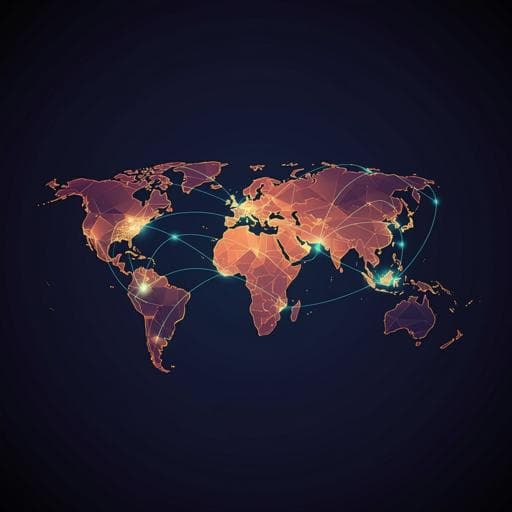
Earth Sciences
Assessing the global ocean science community: understanding international collaboration, concerns and the current state of ocean basin research
R. W. K. Potter and B. C. Pearson
The study examines the global state and structure of ocean basin research in the context of heightened pressures on oceans from climate change and the expanding blue economy. Motivated by the UN Decade of Ocean Science (UNDOS) and Sustainable Development Goal 14 (Life Below Water), the research aims to quantify publication trends and collaboration patterns across the five major ocean basins from 2000–2020. It addresses disparities between well-resourced ocean science programs (e.g., G7) and highly impacted but resource-limited countries, including Small Island Developing States (SIDS) and many African and Southeast Asian nations. By mapping outputs and collaborations, the work seeks to inform strategies for building a more sustainable, equitable, and globally connected ocean science community.
UNESCO and IOC-UNESCO reports have summarized the global status of ocean science and capacity in relation to the UN 2030 Agenda and UNDOS, using bibliometric and scientometric approaches. Additional academic studies have applied bibliometrics to ocean-related domains, including analyses of NOAA Office of Ocean Exploration and Research outputs, national contributions to the International Ocean Discovery Programme, historical trends in oceanography and marine geoscience, and ocean remote-sensing research. These works establish the utility of bibliometrics for top-down assessments of research activity, thematic breadth, and collaboration structures, and contextualize this paper’s scientometric focus on basin-specific outputs and networks.
Data were retrieved from the Web of Science Core Collection (including the Expanded API) for 2000–2020 using targeted title-and-abstract term searches specific to each ocean basin (e.g., Barents Sea, Bering Strait, Gulf of Mexico). Terms were required to appear in both title and abstract to ensure high precision for basin relevance. The resulting dataset comprised approximately 106,000 articles. Each article was assigned to one or more basins based on matched terms; 98% were assigned to a single basin, about 2% to two basins, and 19 articles to three. Author affiliations were extracted and deduplicated to identify institutional and national contributions. International collaboration was defined as the presence of at least two different countries in the deduplicated affiliation set; counts for country pairs reflect co-presence on a paper regardless of additional countries. Counting at country and basin levels can result in multiple counting of the same paper across collaborators or basins, whereas global totals count each paper once. Analyses compared absolute output and world share, and incorporated GERD and researchers-per-million indicators (from UNESCO Institute for Statistics) for context where available. Known limitations in affiliation unification within Web of Science (e.g., parent-institution mappings and consortium entries) were handled by excluding some consortia and acknowledging possible parent overlaps. The approach prioritized precision over recall and excluded global/coastal or process-only studies not tied to specific basins. Data processing and visualization used Python (Pandas, Seaborn). Code is openly available (Zenodo DOI: 10.5281/zenodo.8270555).
- Output growth: Basin-focused ocean research tripled from 2000 to 2020, outpacing overall Web of Science growth (3x vs. 2.5x).
- Basin shares and volumes (2000–2020 totals): Atlantic 47,368 articles (most studied, share declined from ~50% to ~40%); Pacific 40,275 (fourfold increase; nearing parity with Atlantic); Indian 11,079 (9–14% share, ~270 in 2000 to ~1000 in 2020); Arctic 5,185 and Southern 4,008 (~5% each, ~300–400 per year by 2020).
- Country output and shifts: USA largest producer; share declined from ~40% to ~25% by 2020. China rose rapidly (surpassed UK in 2011), reaching nearly 20% of papers by 2020; in Pacific studies, China’s share rose from ~5% (2000) to >40% (2020) while USA’s Pacific share fell from 45% to 30%. Brazil’s overall share increased from <2% to >6%, driven by Atlantic focus (~4% to 13% in Atlantic by 2020).
- Basin-specific country shares (selected): Arctic led by Russia 30% and USA 29%; Canada and Norway ~19% each. Atlantic led by USA 33%; UK 14%; Norway, Germany, France, Canada, Brazil each ~10%. Pacific led by USA 36%, China 27%, Japan 13%, Australia, Mexico, Canada ≥5% each; UK/France/Russia ~4%. Indian led by India 26%, USA 20%, France 9%, China 8%, Australia 6%; Iran and Saudi Arabia grew from ~0% (2000) to ~13% (2020) each in Indian Ocean focus. Southern led by USA 37% and UK 22%; Germany 18%, Australia 17%, France 10%, Italy 8%, New Zealand 7%.
- Collaboration: Internationally coauthored share of basin papers rose from 27% (2000) to 34% (2010) to 36% (2020). USA and China collaborate on ~50% and ~40% of their ocean outputs, respectively (above their overall academic averages). G7 European nations, Australia, and Egypt average ~70%; Russia, Brazil, India ~35–40%; South Africa, Saudi Arabia, Indonesia ~80%; Iran lowest at 31%. Two-thirds of collaborative papers are bilateral; 19% trilateral; 10% involve ≥4 countries.
- Network structure: Central hubs include USA (largest), UK, Germany, Canada (Americas–Europe nexus), and China (Asian hub). Peripheral but active nodes include SIDS (e.g., New Caledonia, Fiji, Bermuda) with strong ties to nearby or historically linked larger economies. Sub-Saharan African countries are largely absent except South Africa; at lower thresholds (≥15 collaborations), more African and SIDS contributions appear but absolute counts remain small.
- Regional trends (coastal and SIDS): South America more than doubled its global share (to ~5% in 2019); excluding Brazil, the region still doubled since 2000. Africa and SIDS plateaued around ~3% since mid-2010s; Central America stable at ~1%.
- Institutional concentration: Polar basin research is highly concentrated; e.g., Arctic led by Russian Academy of Sciences (20.9%) and Helmholtz Association (10.1%); Southern led by Helmholtz (11.9%) and UK bodies (NERC and UKRI, each 11.1%; BAS 10.8%). Pacific led by Chinese Academy of Sciences (11.0%) and NOAA (6.2%); Indian led by India’s CSIR (8.3%), Ministry of Earth Sciences (7.4%), and NIO (7.3%); Atlantic more diversified with CNRS (5.5%) and NOAA (4.0%).
- National dependence on key institutes: In several countries, a few institutes account for most ocean-basin output (e.g., Greenland Institute of Natural Resources 96% of Greenland’s; Russian Academy of Sciences 73.7% of Russia’s ~4,433 papers; CNRS 61% of France’s ~7,841). SIDS show similar concentration (e.g., UWI across campuses; Smithsonian Tropical Research Institute 75% of Panama’s).
- Capacity and equity: Sub-Saharan Africa’s limited output relates to low GERD, limited infrastructure, fewer researchers per capita, and barriers to collaboration, contrasting with South America’s stronger growth linked to slightly higher GERD, collaborations with US institutions, and educational/infrastructural initiatives.
Findings demonstrate that global ocean-basin science has expanded rapidly, with the Pacific poised to surpass the Atlantic due to China’s surge. Despite rising international collaboration, research remains concentrated around G7 hubs and China, with peripheral engagement from SIDS and limited participation by sub-Saharan Africa. The results underscore the critical role of infrastructure-intensive institutions and national academies, especially for polar and deep-ocean work, and show how national research capacity and historical/language ties shape collaboration networks. Disparities in GERD, infrastructure, and researcher densities explain much of the uneven regional participation. These patterns directly inform UNDOS and SDG 14 objectives by identifying where capacity building, equitable partnerships, and infrastructure investments could most effectively broaden participation and impact. The work suggests leveraging existing hubs to foster inclusive, multilateral collaborations; improving policy coherence and science diplomacy; and supporting education, early-career development, and open data/HPC ecosystems to reduce access barriers. Given evidence that highly multilateral papers tend to be more influential (higher citation impact), strategic support for broad collaborations could amplify scientific influence while ensuring equity and sustainability.
This study provides a comprehensive scientometric assessment of basin-specific ocean science (2000–2020), quantifying outputs, collaboration structures, and institutional concentration across the Arctic, Atlantic, Indian, Pacific, and Southern Oceans. It reveals accelerating growth, a shift toward Pacific dominance, strong but hub-centric international networks, and significant regional disparities, particularly limited contributions from sub-Saharan Africa. The analysis highlights the centrality of well-funded research institutes and the importance of infrastructure for enabling participation. To advance UNDOS and SDG 14 goals, the authors suggest: expanding educational and early-career programs; investing in observational and computational infrastructure; fostering equitable, multilingual and regionally sensitive collaborations; leveraging SDGs and UNCLOS to align priorities with development assistance; increasing policy coherence and responsible financing; and enhancing open-source data and computing access. Future research could include topical content analyses to link themes with geopolitical and economic drivers, evaluations of policy impacts, and integration of regional journal databases to capture underrepresented outputs.
- Data source bias: Reliance on Web of Science, which favors influential English-language journals, underrepresents local-language and regional outputs from the Global South; global/coastal or process-only studies not tied to basins were excluded.
- Search precision over recall: Requiring basin terms in both title and abstract increases precision but may omit relevant studies, lowering recall.
- Affiliation normalization: Parent-institution mapping in Web of Science can create ambiguities (e.g., overlapping parents), potentially affecting institutional attributions.
- Collaboration counting: Country-level and basin-level counts can double-count the same paper across collaborators or basins; global totals avoid this but complicate direct comparisons of collaboration rates across scales.
- Impact not directly assessed: Citation influence and topic-level motivations were outside scope; GERD and researcher indicators were incomplete for some countries.
Related Publications
Explore these studies to deepen your understanding of the subject.







